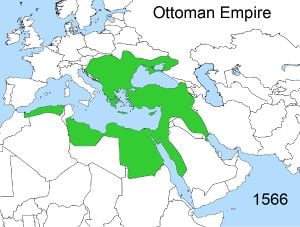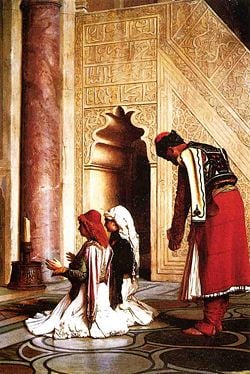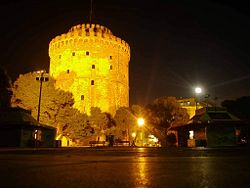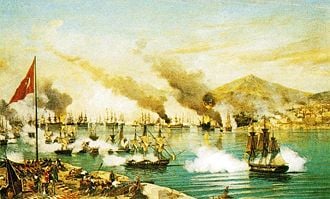Ottoman Greece
 From Nwe
From Nwe 
Most of Greece was part of the Ottoman Empire from the fourteenth century until its declaration of independence in 1821. After capturing Constantinople in 1453, the Ottoman Turks first crossed into Europe in 1354, the start of the Ottoman Wars in Europe. These were understood as a religious duty to spread Islamic rule and faith. The Byzantine Empire, which had ruled most of the Greek-speaking world for over 1100 years, had been fatally weakened since the sacking of Constantinople by the Crusaders in 1204. Having defeated the Bulgarians in 1371, and the Serbs in 1389, the Ottomans advanced south into Greece proper, capturing Athens in 1458. The Greeks held out in the Peloponnese until 1460, and the Venetians and Genoese clung to some of the islands, but by 1500, most of the plains and islands of Greece were in Ottoman hands. The mountains of Greece were largely untouched, and were a refuge for Greeks to flee foreign rule.
Cyprus fell in 1571, and the Venetians retained Crete until 1670. The Ionian Islands were only briefly ruled by the Ottomans (Kefalonia from 1479 to 1481 and from 1485 to 1500), and remained primarily under the rule of Venice. Inspired by the new spirit of nationalism sweeping through Europe and by the American Revolutionary War, the Greeks fought a war of independence from 1821 until 1829. They became the first Ottoman province to achieve complete independence. Bulgaria, Romania, Bosnia, and, officially Serbia, did not follow until 1878. After French intervention in 1828, the great powers met in London and decided to recognize a sovereign Greek state. Many were enthusiastic about this development, which they saw as reviving the classical Greek legacy. Relations between Greece and the Ottoman Empire and its successor, Turkey have often been strained, not least of all surrounding disputed sovereignty of islands and the issue of Cyprus. While some scholars stress the Ottoman history of religious toleration and suggest that former provinces of the Ottoman empire, especially in border zone contexts, might help to bridge European and Muslim civilization, the particularities of Greek-Turkish relations may mitigate against this. Not only did the Turks conquer the Greek homeland but they destroyed the Byzantine Empire, which had represented a continuation both of the Roman Empire and of classical Greece into the medieval period. To some extent, leadership of the Orthodox world then shifted to Russia, which claimed to be the Third Rome.[1]
On the other hand, as Turkey moves towards membership of the European Union, which Greece joined in 1981, good relations between these two nations has consequences for whether what has been called the "Dialogue between civilizations" or their clash will dominate the future.[2] How people deal with histories that embitter relations is ultimately vital for human and planetary survival.
Ottoman rule
The consolidation of Ottoman rule was followed by two distinct trends of Greek migration. The first entailed Greek intellectuals, such as Johannes Vissarion, Georgius Plethon Gemistos, and Marcos Mousouros, migrating to Western Europe and influencing the advent of the Renaissance (though the large scale migration of Greeks to the West, most notably Italian University cities, began far earlier, following the Crusader capture of Constantinople[3]). The second entailed Greeks leaving the plains of the Greek peninsula and resettling in the mountains, where the rugged landscape made it hard for the Ottomans to establish either military or administrative presence.[4]
Administration
The Ottomans divided Greece into six sanjaks, each ruled by a Sanjakbey accountable to the Sultan, who established his capital in Constantinople in 1453. Before this division occurred, the Ottomans implemented the millet system, which segregated peoples within the Ottoman Empire based on religion. The conquered land was parceled out to Ottoman nobles, who held it as feudal fiefs (timars and ziamets) directly under the Sultan's authority. The land could not be sold or inherited, but was reverted to the Sultan's possession when the fief-holder died.
Economy
The economic situation of the majority of Greece deteriorated heavily during the Ottoman occupation of the country. Heavy burdens of taxation were placed on the Christian peasantry, and many Greeks were reduced to subsistence farming, whereas during prior eras the region had been heavily urbanized. The exception to this rule was in Constantinople and the Ionian islands, where many Greeks lived in prosperity. Greeks heavily resented the declining economic situation in their country during the Turkish occupation.[5]
Religion
The Sultan regarded the Ecumenical Patriarch of the Greek Orthodox Church as the leader of all Orthodox, Greeks or not, within the empire. The Patriarch was accountable to the Sultan for the good behavior of the Orthodox population, and in exchange he was given wide powers over the Orthodox communities, including ethnic Greeks. The Patriarch controlled the courts and the schools, as well as the Church, throughout the Greek communities of the empire. This made Orthodox priests, together with the local magnates, the effective rulers of Greek villages. Some Greek towns, such as Athens and Rhodes, retained municipal self-government, while others were put under Ottoman governors. Some areas, such as the Mani Peninsula in the Peloponnese, and parts of Crete (Sfakia) and Epirus, remained virtually independent. During the frequent Turkish-Venetian Wars, the Greeks sided both with the Venetians and Ottomans. (For example, during the Turkish-Venetian War (1714-1718in 1715, local Greeks supplied the Turks and refused to join the Venetian army.)[6] The Orthodox Church assisted in the preservation of the Greek heritage, and during the nineteenth century, adherence to the Greek Orthodox faith became increasingly a mark of Greek nationality.
As a rule, the Ottomans did not require the Greeks to become Muslims, although many did so in order to avert the economic hardships of Ottoman rule. Under the millet logic, a converted Greek, although retaining culture and language, was classified simply as "Muslim." In the eyes of the Christians, however, they were deemed Turks. Some Greeks either became neo-martyrs, such as Saint Efraim the Neo-Martyr or Saint Demetrios the Neo-martyr while others became Crypto-Christians (Greek Muslims who were secret practitioners of the Greek Orthodox faith) in order to avoid heavy taxes and at the same time express their identity by maintaining their secret ties to the Greek Orthodox Church. Crypto-Christians ran the risk of being killed if they were caught practicing a non-Muslim religion once they converted to Islam.
The worst persecutions of Christians took place under the reign of Selim I, known as Selim the Grim, who attempted to stamp out Christianity from the Ottoman Empire. Selim ordered the confiscation of all Christian churches, and while this order was later rescinded, Christians were heavily persecuted during his era.[7]
Taxation and the "tribute of children"
Greeks also paid a land tax and a tax on trade, but these were collected irregularly by the inefficient Ottoman administration. Provided they paid their taxes and gave no trouble, they were left to themselves. Greeks, like other Christians, were also made to pay the jizya, or Islamic poll-tax which all non-Muslims in the empire were forced to pay in order to practice their religion. Non-Muslims did not serve in the Sultan's army, but young boys were forcibly converted to Islam and made to serve in the Ottoman military.
These practices are called the "tribute of children" (devshirmeh) (in Greek παιδομάζωμα paidomazoma, meaning "child gathering"), whereby every Christian community was required to give one son in five to be raised as a Muslim and enrolled in the corps of Janissaries, elite units of the Ottoman army. This imposition, at first, aroused surprisingly little opposition since Greeks who were living on the plains could not offer effective resistance. Still, there was much passive resistance, for example Greek folklore tells of mothers crippling their sons to avoid their abduction. Nevertheless, entrance into the corps (accompanied by conversion to Islam) offered Greek boys the opportunity to advance as high as governor or even Grand Vizier. Some suggest that "recruitment" to the Janissary was viewed as a means of social advancement and was even welcomed.[8]
Opposition of the Greek populace to taxing or paidomazoma resulted in grave consequences. For example, in 1705, an Ottoman official was sent from Naoussa in Macedonia to search and conscript new Janissaries and was killed by Greek rebels who resisted the burden of the devshirmeh. The rebels were subsequently beheaded and their severed heads were displayed in the city of Thessaloniki. The "tribute of children" was met with various reactions ranging from contempt to support. In some cases, it was greatly feared, as Greek families would often have to relinquish their own sons who would convert and return later as their oppressors. In other cases, the families bribed the officers to ensure that their children got a better life as a government officer.[9] The Greek historian Papparigopoulos stated that approximately one million Greeks were conscripted into Janissaries during the Ottoman era.
Demographics
The incorporation of Greece into the Ottoman Empire had other long-term consequences. Economic activity declined to a great extent (mainly because trade flowed towards cities like Smyrna and Constantinople), and the population declined, at least in the lowland areas (Ottoman censuses did not include many people in mountainous areas). Turks settled extensively in Thrace. After their expulsion from Spain in 1492, Sephardic Jews settled in Thessaloniki (known in this period as Salonica or Selanik), which became the main Jewish centre of the empire. The Greeks became inward-looking, with each region cut off from the others—only Muslims could ride a horse, which made travel difficult. Greek culture declined, and outside the Church few people were literate. The Greek language broke up into regional dialects, and absorbed large numbers of Turkish words. Greek music and other elements of Greek folk-culture were, to a great extent, influenced by Ottoman trends.
Ottoman decline
After around the unsuccessful Ottoman siege of Vienna, in 1683, the Ottoman Empire entered a long decline both militarily against the Christian powers and internally, leading to an increase in corruption, repression and inefficiency. This provoked discontent which led to disorders and occasionally rebellions. As more areas drifted out of Ottoman control, the Ottomans resorted to military rule in parts of Greece. This only provoked further resistance. Moreover, it led to economic dislocation, as well as accelerated population decline. Another sign of decline was that Ottoman landholdings, previously fiefs held directly from the Sultan, became hereditary estates (chifliks), which could be sold or bequeathed to heirs. The new class of Ottoman landlords reduced the hitherto free Greek peasants to serfdom, leading to further poverty and depopulation in the plains. However, the overall Greek population in the plains was reinforced by the return of some Greeks from the mountains during the seventeenth century.
On the other hand, the position of educated and privileged Greeks within the Ottoman Empire improved in the seventeenth and eighteenth centuries. As the empire became more settled, and began to feel its increasing backwardness in relation to the European powers, it increasingly recruited Greeks who had the kind of administrative, technical, and financial skills which the Ottomans lacked.[10] From about 1700, Greeks began to fill some of the highest offices of the Ottoman state. The Phanariotes, a class of wealthy Greeks who lived in the Phanar district of Constantinople, became increasingly powerful. Their travels to Western Europe as merchants or diplomats brought them into contact with advanced ideas of liberalism and nationalism, and it was among the Phanariotes that the modern Greek nationalist movement was born.
Greek nationalism was also stimulated by agents of Catherine the Great, the Orthodox ruler of the Russian Empire, who hoped to acquire the lands of the declining Ottoman state, including Constantinople itself, by inciting a Christian rebellion against the Ottomans. However, during the Russian-Ottoman War which broke out in 1768, the Greeks did not rebel, disillusioning their Russian patrons. The Treaty of Kuchuk-Kainarji (1774) gave Russia the right to make "representations" to the Sultan in defense of his Orthodox subjects, and the Russians began to interfere regularly in the internal affairs of the Ottoman Empire. This, combined with the new ideas let loose by the French Revolution of 1789, began to reconnect the Greeks with the outside world and led to the development of an active nationalist movement.
Greece was only peripherally involved in the Napoleonic Wars, but one episode had important consequences. When the French under Napoleon Bonaparte seized Venice in 1797, they also acquired the Ionian Islands. The islands were elevated to the status of a French dependency called the Septinsular Republic, which possessed local autonomy. This was the first time Greeks had governed themselves since the fall of Constantinople in 1453. Among those who held office in the islands was John Capodistria, destined to become independent Greece's first head of state. By the end of the Napoleonic Wars in 1815, Greece had re-emerged from its centuries of isolation. British and French writers and artists began to visit the country, and wealthy Europeans began to collect Greek antiquities. These "philhellenes" were to play an important role in mobilizing support for Greek independence. Between 1821 and 1829, the Greeks rebelled against the Ottomans, becoming the first Ottoman province to gain independence. The revolt was motivated both by the new spirit of nationalism that swept through Europe following the French Revolution and by a revival of pride in Greece's history as the fountain of learning in the ancient world.
The War of Independence
A secret Greek nationalist organization called the "Friendly Society" or "Company of Friends" (Filiki Eteria) was formed in Odessa in 1814. The members of the organization planned a rebellion with the support of wealthy Greek exile communities in Britain and the United States. They also gained support from sympathizers in Western Europe, as well as covert assistance from Russia. The organization secured Capodistria, who became Russian Foreign Minister after leaving the Ionian Islands, as the leader of the planned revolt. On March 25 (now Greek Independence Day), 1821, the Orthodox Bishop Germanos of Patras proclaimed a national uprising. Simultaneous risings were planned across Greece, including in Macedonia, Crete, and Cyprus. With the initial advantage of surprise, aided by Ottoman inefficiency and Turk's fight against Ali Pasha of Tepelen, the Greeks succeeded in capturing the Peloponnese and some other areas. Some of the first Greek actions were taken against unarmed Ottoman settlements, with about 40 percent of Turkish and Albanian Muslim residents of the Peloponnese killed outright, and the rest fleeing the area or being deported.[11]
The Ottomans soon recovered, and retaliated in turn with similar savagery, massacring the Greek population of Chios and other towns. This worked to their disadvantage by provoking further sympathy for the Greeks in Western Europe, although the British and French governments suspected that the uprising was a Russian plot to seize Greece and possibly Constantinople from the Ottomans. The Greeks were unable to establish a coherent government in the areas they controlled, and soon fell to fighting amongst themselves. Inconclusive fighting between Greeks and Ottomans continued until 1825, when the Sultan sent a powerful fleet and army from Egypt to ravage the Aegean Islands and the Peloponnese.
The atrocities that accompanied this expedition, together with sympathy aroused by the death of the poet and leading philhellene Lord Byron at Messolongi in 1824, eventually led the Western Powers to intervene. In October 1827, the British, French, and Russian fleets, on the initiative of local commanders but with the tacit approval of their governments, attacked and destroyed the Ottoman fleet at the Battle of Navarino. This was the decisive moment in the war of independence. In October 1828, the French landed troops in the Peloponnese to stop the Ottoman atrocities. Under their protection, the Greeks were able to regroup and form a new government. They then advanced to seize as much territory as possible, including Athens and Thebes, before the Western Powers imposed a ceasefire.
A conference in London, in March 1829, proposed an independent Greek state with a northern frontier running from Arta to Volos, and including only Euboia and the Cyclades among the islands. The Greeks were bitterly disappointed at these restricted frontiers, but were in no position to resist the will of Britain, France and Russia, who were largely responsible for Greek independence. By the Convention of May 11, 1832, Greece was finally recognized as a sovereign state. Capodistria, who had been Greece's unrecognized head of state since 1828, was assassinated in October 1831. To prevent further experiments in republican government, the Western Powers insisted that Greece be a monarchy, and the Bavarian Prince Otto, rather than someone with a Greek origin was chosen to be its first king.
Legacy
The years of rule by the Ottomans has impacted on relations between the modern nations states of Greece and Turkey. Relations have been generally tense. The Fall of Constantinople on Tuesday May 29 1452 still makes "Tuesday" as "unlucky day" for Greeks. In 1922, Turkish troops drove "by 1922 were strong enough again to drive Greece’s troops, and centuries of Greek society, from Anatolia."[1] The position of the Turkish community on the island of Cyprus, where many Greeks wanted union with Greece added to the political tension. In 1974, Turkey invaded Cyprus following a pro-union coup against president Makarios III and established the Turkish Federative State of Cyprus, later the Turkish Republic of Northern Cyprus. Dispute continues regarding sovereignty of several islands including one that is unpopulated.[12] One vision of border-zones such as that between Greece and Turkey, which is also a frontier between culture and religions is that they produce conflict and tend towards confrontation. Another vision is that such zones can become inter-civilizational bridges based on cooperation. Greece is a member of the European Union while Turkey has applied to join. If Turkey's membership proceeds, good relations between Greece and Turkey will have wider implications not only in Europe but also for the rest of the world. On a positive note, the influx of Greek scholars into Europe following 1453 made a major contribution to the Renaissance.
Notes
- ↑ 1.0 1.1 The Economist, The Fall of Constantinople. Retrieved July 20, 2008.
- ↑ The United Nations, Dialogue among civilizations, UN Year of Dialogue Among Civilizations. Retrieved July 20, 2008
- ↑ Warren Treadgold, A History of Byzantine State and Society (Stanford, CA: Stanford University Press, 1997, ISBN 9780804724210).
- ↑ Vacalopoulos (1976), p 45.
- ↑ Paroulakis (1984), p 10-11.
- ↑ L.S. Stavrianos, The Balkans since 1453 (New York: Rinehart, 1958, ISBN 9780030096853).
- ↑ Paroulakis (1984), p 11.
- ↑ David Nicolle and Christa Hook, The Janissaries (London: Osprey, 1995, ISBN 9781855324138), p 4.
- ↑ Shaw (1976), p 114.
- ↑ Hobsbawm (1962), p 181-185.
- ↑ Jelavich (1983), p 217.
- ↑ CNN, Greece, Turkey circle island each says is theirs. Retrieved July 20, 2008.
References
ISBN links support NWE through referral fees
- Hobsbawm, Eric John. 1962. The Age of Revolution. New York: New American Library. ISBN 0451627202.
- Jelavich, Barbara. 1983. History of the Balkans, 18th and 19th Centuries. New York: Cambridge University Press. ISBN 0521274583.
- Paroulakis, Peter H. 1984. The Greek War of Independence. Darwin, AU: Hellenic International Press. ISBN 9780959089417.
- Shaw, Stanford J., and Ezel Kural Shaw. 1976. History of the Ottoman Empire and modern Turkey. Cambridge: Cambridge University Press. ISBN 9780521212809.
- Vacalopoulos, Apostolis. 1976. The Greek Nation, 1453-1669. New Brunswick, NJ: Rutgers University Press. ISBN 9780813508108.
External links
All links retrieved November 18, 2022.
Credits
New World Encyclopedia writers and editors rewrote and completed the Wikipedia article in accordance with New World Encyclopedia standards. This article abides by terms of the Creative Commons CC-by-sa 3.0 License (CC-by-sa), which may be used and disseminated with proper attribution. Credit is due under the terms of this license that can reference both the New World Encyclopedia contributors and the selfless volunteer contributors of the Wikimedia Foundation. To cite this article click here for a list of acceptable citing formats.The history of earlier contributions by wikipedians is accessible to researchers here:
The history of this article since it was imported to New World Encyclopedia:
Note: Some restrictions may apply to use of individual images which are separately licensed.
↧ Download as ZWI file | Last modified: 02/04/2023 00:28:53 | 30 views
☰ Source: https://www.newworldencyclopedia.org/entry/Ottoman_Greece | License: CC BY-SA 3.0
 ZWI signed:
ZWI signed:


 KSF
KSF